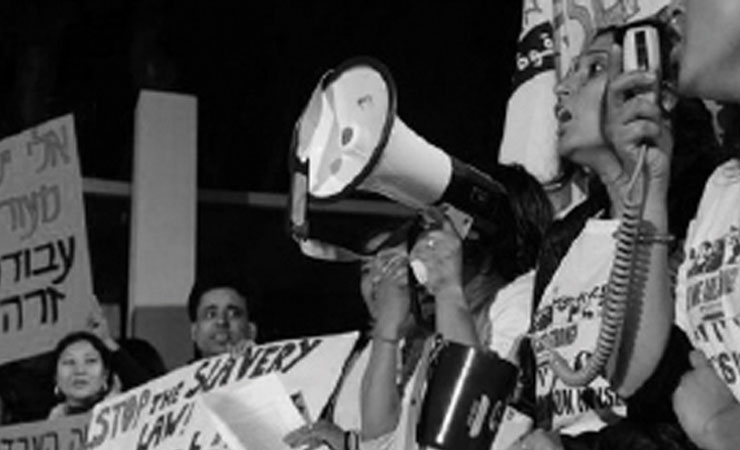By Hanna Zohar, Coordinator of Palestinian Workers
H.B. is a Palestinian from the Territories who was employed in agriculture at Kibbutz Almog. On January 2, 2010, he fell and injured his hand in the fields. He was then transferred to a hospital in Jericho where he underwent surgery. Only after the employer was contacted by Kav LaOved did he file a “250bl” form to report a work accident. Recognition from the Israeli National Insurance Institute came through on June 15, 2011, 17 months after the injury. Only after this recognition was the worker able to file a request for medical expense reimbursement. Two years and four months after his accident, on May 10, 2012, he received a payment of 2,052 NIS, which Kav LaOved filed for on his behalf. Until then, H.B. was forced to cover expensive medical fees out of his own pocket. Had the worker been transferred to an Israeli hospital initially, he would not have needed to pay for the cost of hospitalization and surgery.
According to reports by the Israeli Ministry of Industry, Trade and Labor (MOITAL), the number of deaths due to work accidents in the construction sector increased from 23 in 2010 to 38 in 2011. Close to 30% of the deceased workers in 2011 were Palestinians, refugee/asylum seekers, and migrant workers. The number of deaths indicates an even larger number of work accidents in this sector, which usually result in injuries of varying severity. Data from the National Insurance Institute (NII) shows that the total compensations paid to workers for work injuries increase every year.
Beyond medical and emotional suffering, a work injury can force cessation of work and thus total loss of income. Due to NII interpretations of Israeli law, injured workers may be forced to pay for ongoing medical treatment themselves at a time when they are most financially and emotionally vulnerable. If they lack funds for this, workers are de-facto prevented from receiving treatment and their medical condition can deteriorate to the point of severe disability. Kav LaOved aids Palestinian, refugee/asylum seeker, and migrant workers who are injured at work in navigating NII bureaucracy, which can be a serious barrier to receiving fair compensation for work-related injuries.
Specific challenges faced by Palestinian workers
Palestinian workers from the Occupied Palestinian Territories (OPT) face unique challenges which prevent acquisition of compensations legally entitled to them and thus delaying or preventing critical medical treatment. Section 5 of the National Insurance Law – which addresses work injury – cites that any person employed in Israel who suffers an injury due to a work accident is eligible to receive medical treatment, rehabilitation and compensation at the level of 75% of the worker’s salary, if a medical certificate indicating disability is issued within 90 days (requiring the employer’s confirmation of an accident).
Since 2005, the National Insurance Law also applies to work injuries of Palestinian workers employed in the settlements. However, such workers are now being sent to hospitals in the OPT, due to a specific agreement between Magen David Adom, Israel’s national emergency service, and the Palestinian Red Crescent Society. When an accident occurs in a settlement, the injured Palestinian worker is evacuated by a Magen David ambulance, but then transferred by a Red Crescent ambulance to a nearby Palestinian hospital. Workers prefer initial treatment in an Israeli hospital as it ensures a higher quality of care and a degree of documentation that will result in faster compensation to the worker afterwards from the NII (the NII may also refute evidence provided by OPT hospitals or question its validity). Furthermore, workers receive more compensation if first treated at Israeli hospitals due to the NII’s differential scale of compensation for Israeli and versus OPT hospitals.
Before being allowed to even apply for reimbursements for ongoing medical treatment, Palestinian workers must first apply for a NII certificate that states the NII recognizes the injury as work-related. This can take between three and six months to secure, if the employer is cooperative. In an agreement between the NII and the largest Israeli HMO Clalit Health Services, Palestinian workers must pay for ongoing treatments out-of-pocket and collect all receipts for reimbursement. Only after treatments are paid can workers submit their receipts to the HMO, which then sends them to the NII for approval. This process can take another four to eight months. In practice, workers can wait up to 14 months before receiving any compensation for ongoing medical treatments, if they are even able to afford their care before reimbursements. In this process, if workers are unable to pay for their own treatment, there is no other way to receive ongoing care.
In summary, in most cases there is no cooperation from the employer and, as a result, the process can take up to a year and half. During that period, workers are required to pay from their own pockets for medical treatment. If they are injured to the degree of being unable to work, they have no way of paying for treatment and are de-facto prevented from accessing any medical care.
Kav LaOved demands that all workers in Israel receive all necessary medical treatment following a work accident, without delay and without the stipulation that the NII must recognize it as a work accident. The policy should recognize the employer’s report as sufficient evidence of an accident. The current existing delays for Palestinian and other non-Israeli workers contradict with the spirit of the law and clearly discriminate against non-Israeli workers who suffer work injuries, as compared to their Israeli counterparts.


